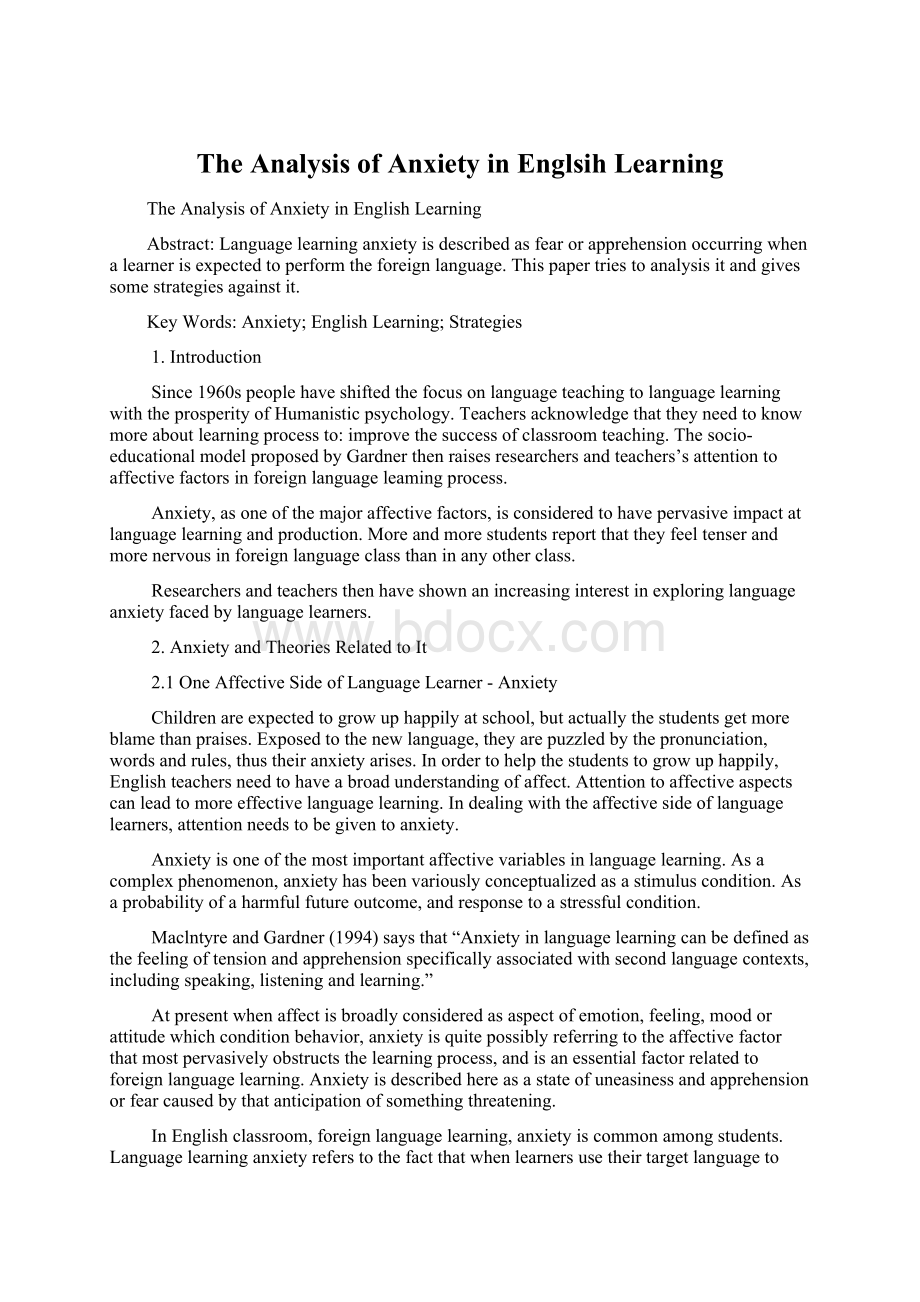The Analysis of Anxiety in Englsih Learning.docx
《The Analysis of Anxiety in Englsih Learning.docx》由会员分享,可在线阅读,更多相关《The Analysis of Anxiety in Englsih Learning.docx(5页珍藏版)》请在冰豆网上搜索。

TheAnalysisofAnxietyinEnglsihLearning
TheAnalysisofAnxietyinEnglishLearning
Abstract:
Languagelearninganxietyisdescribedasfearorapprehensionoccurringwhenalearnerisexpectedtoperformtheforeignlanguage.Thispapertriestoanalysisitandgivessomestrategiesagainstit.
KeyWords:
Anxiety;EnglishLearning;Strategies
1.Introduction
Since1960speoplehaveshiftedthefocusonlanguageteachingtolanguagelearningwiththeprosperityofHumanisticpsychology.Teachersacknowledgethattheyneedtoknowmoreaboutlearningprocessto:
improvethesuccessofclassroomteaching.Thesocio-educationalmodelproposedbyGardnerthenraisesresearchersandteachers’sattentiontoaffectivefactorsinforeignlanguageleamingprocess.
Anxiety,asoneofthemajoraffectivefactors,isconsideredtohavepervasiveimpactatlanguagelearningandproduction.Moreandmorestudentsreportthattheyfeeltenserandmorenervousinforeignlanguageclassthaninanyotherclass.
Researchersandteachersthenhaveshownanincreasinginterestinexploringlanguageanxietyfacedbylanguagelearners.
2.AnxietyandTheoriesRelatedtoIt
2.1OneAffectiveSideofLanguageLearner-Anxiety
Childrenareexpectedtogrowuphappilyatschool,butactuallythestudentsgetmoreblamethanpraises.Exposedtothenewlanguage,theyarepuzzledbythepronunciation,wordsandrules,thustheiranxietyarises.Inordertohelpthestudentstogrowuphappily,Englishteachersneedtohaveabroadunderstandingofaffect.Attentiontoaffectiveaspectscanleadtomoreeffectivelanguagelearning.Indealingwiththeaffectivesideoflanguagelearners,attentionneedstobegiventoanxiety.
Anxietyisoneofthemostimportantaffectivevariablesinlanguagelearning.Asacomplexphenomenon,anxietyhasbeenvariouslyconceptualizedasastimuluscondition.Asaprobabilityofaharmfulfutureoutcome,andresponsetoastressfulcondition.
MaclntyreandGardner(1994)saysthat“Anxietyinlanguagelearningcanbedefinedasthefeelingoftensionandapprehensionspecificallyassociatedwithsecondlanguagecontexts,includingspeaking,listeningandlearning.”
Atpresentwhenaffectisbroadlyconsideredasaspectofemotion,feeling,moodorattitudewhichconditionbehavior,anxietyisquitepossiblyreferringtotheaffectivefactorthatmostpervasivelyobstructsthelearningprocess,andisanessentialfactorrelatedtoforeignlanguagelearning.Anxietyisdescribedhereasastateofuneasinessandapprehensionorfearcausedbythatanticipationofsomethingthreatening.
InEnglishclassroom,foreignlanguagelearning,anxietyiscommonamongstudents.Languagelearninganxietyreferstothefactthatwhenlearnersusetheirtargetlanguagetolisten,speak,read,andwrite,theyfeelthattheyusuallycannotaccuratelyandeffectivelyexpresswhattheymeanthustheyfeel
nervousandupset.
Languagelearninganxietyisalsodescribedasfearorapprehensionoccurringwhenalearnerisexpectedtoperformthesecondorforeignlanguage(GardnerandMaclntyre,1993:
26).Threecomponentsofforeignlanguagelearninganxietyhavebeenidentified:
1)communicationapprehension,arisingfromlearners’abilitytoadequatelyexpressmaturethoughtsandideas;2)fearofnegativesocialevaluation,arisingfromalearner’sneedtomakeapositivesocialimpressionuponothers;3)testanxiety,orapprehensionoveracademicevaluation.
2.2TheoriesRelatedtoIt
Inadditiontoitsrelationshiptovarioushumanbehaviors,anxietyisundoubtedlyadistinctivefeatureinsecondlanguageacquisition.Theretheoriesareparticularlyrelatedtotheconstructoflanguageanxiety.
TheAffectiveFilterHypothesisispartofKrashen’sInputHypothesis.TheconceptofanaffectivefilterwasproposedbyDulayandBurt,andKrashensummarizedstudiesonaffectivefactorstoconceptualizethisconstructintothreecategories:
motivation,self-confidence,andanxiety(Krashcn1982).AccordingtotheInputHypothesis,languageacquisitionhappenswhentheinputiscomprehensible,andwhenthelearner’saffectivefilterislow.Therefore,Krashenhypothesizedthattheseattitudinalfactorsrelateddirectlytolanguageacquisition.Inotherwords,onlywhenlearnershavehighmotivationself-confidenceandlowanxietycantheyacceptcomprehensibleinputandacquirethetargetlanguage.
Schumannproposedthatlearners’degreeofacculturationintothetargetlanguagegroupdecidedtheirdegreeoflanguageacquisition.AccordingtotheAcculturationHypothesis,itisreasonabletotheorizethatwithdeeperidentificationandmorecontactwiththetargetculture,languagelearnersinvitemoreinputanddeveloploweranxiety.Therefore,thereseemstobearelationshipbetweenacculturationandanxiety.
Lambenhasdividedsecondlanguagemotivationintoinstrumental,integrativeorientation,andhefurtherdefinedintegrativemotivationasstudent’sdesiretolearnmoreabouttheotherculturalcommunityinordertobecomeapotentialmemberoftheothergroup.Infact,manystudiesconductedbyLambertandGardnerhavedemonstratedthatintegrativemotivationisstronglyrelatedtolanguagelearners’achievementandperformance.
TheconceptofintegrativemotivationcorrespondstothatoftheAcculturationHypothesis.Thelanguagelearners’degreeofacculturationandwillingnesstobecomepartofthetarget
languagegroupinfluencetheirlevelofanxietyinsecondlanguageacquisition.
3.DiscussiononAnxietyandLanguageLearning
Anxietyhasbeenpredictedasavariablenegativelyaffectinglanguagelearningsincethemid-1960sandalotofstudieshavebeenconductedtotestthishypothesis.
InBenjamin’s(1981)study,thestudentsofhigh-anxietygroupreportmoreproblemsonstudymethodsandtheycontributetheiranxiety/apprehensionoverexaminationstotheirineffectivestudystrategies.
Mulla(Benjaminetal.,1981)predictsthatforthecognitivestrategies(rehearsal,organizationandelaboration)overallpositiveassociationswithleamingwouldbestrongerforlow-anxietyindividualsthanforhigh-anxietylearnersandsuggeststhatthespecificroleofanxietyinrelationtotheuseoflearningstrategiesshouldbefurtherexamined.
Aida(1994)arguesthatlanguageteacherscanmakeitpossibleforanxiousstudentstomaximizetheirlanguagelearningbybuildinganon-threateningandpositivelearningenvironment,aswellasbyhelpingthemacquiringeffectivestudyandlearningstrategies.
Maclntyre,NoelsandClement(1997)examinetherelationshipbetweenlanguageanxietyanduseoflanguagelearningstrategies.Theresultsshowthatlanguageanxietyisnegativelycorrelatedwiththeuseofthreecategoriesoflearningstrategics:
cognitive,Meta-cognitiveandsocio-affectivestrategies.
WarrandDowning(2000)examinetheinteractionsbetweensomelearningstrategiesandanxietyandclaimthatlearnerswhoapplyparticularstrategiesaremoreable,moremotivatedorlessanxiousthanothers.
InChinatherearealsoattemptsmadeonthisissue.Han’s(2002)researchresultsindicatethatthreeanxietylevelsofstudentshavedifferentcharacteristicsinemployinglearningstrategies:
high-anxietystudentsaretheleastfrequentinusingbothcognitiveandmeta-cognitivestrategics;medium-anxietystudentsusesomelearningstrategiessuchaselaborationandpracticealmostasfrequentlyaslow-anxietystudents;lowanxiousstudentsusemeta-cognitivestrategiesfarmorefrequentlythanstudentsofotheranxietylevels.Althoughdetailedstudyhasbeenmade,itisstilldoubtfultoconcludestudents’anxietyinEnglishlearningmayresultfromtheirlowfrequencyintheuseoflearningstrategies.
AccordingtoChen(2006),therelationshipbetweenEnglishclassroomanxietyandlearningstrategyisnegativeandinteractiveeffectofEnglishclassroomanxietyandEnglishlearningstrategiesonEnglishachievementisnotsignificantamongseniorgradethreehighschoolstudents.
InYang’s(2006)research,someofthelearningstrategiesarefoundtocorrelatewithELAforthejuniorandseniormiddleschoolstudents,butforthecollegestudents,thereisnocorrelationbetweenthem;withregardtothebestpredictorofEnglishachievement,arethecognitivestrategiesforthejuniormiddleschoolstudents,themeta-cognitiveandsocialstrategiesforthejuniormiddleschoolstudents,themeta-cognitiveandsocialstrategicsfortheseniormiddleschoolstudents,thememorystrategiesforthecollegestudents.
4.StrategiesAgainstLanguageLearningAnxiety
4.1BuildingupStudent’sSelf-Confidence
ThedegreeofEnglishlearners’self-confidenceinfluencestheirEnglishachievementdirectly.MaclntyreandGardneremphasizedtheimportanceof“self-confidence”.Hesuggestedthat“inbiculturalormulticulturalsettings,self-confidencewouldbeasecondarymotivationarisingfromthequalityandfrequencyofinteractionwiththesecondlanguagegroup”and“relativeself-confidencewasmorehighlycorrelatedwithmotivationtouseEnglishthanwithmotivationtolearnEnglish”(MaclntyreandGardner,199lb).
Englishteachersplayaveryimportantroleinbuildingupstudent’sself-confidence.TheycouldprovidestudentswithmultipleopportunitiesforclassroomsuccessinEnglish,offerstudentswordsofencouragementandpraisethemevenfortheirunnoticeableachievementandprogress,payattentiontostrongpointsofeachstudentandarousetheirinterestinEnglishlearningandsoon.
4.2MakingProperExpectations
ItisveryimportantthatEnglishlearners,especiallythosewithlowEnglishproficiencyshouldmakerealisticexpectationsinEnglishlearning.Onlywhentheexpectationyoumakeiswellwithinyourlanguage